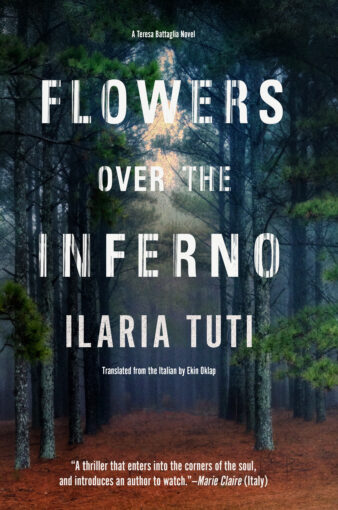If there is a rookie policeman, she prefers to push him, sometimes even infuriate him with her harsh jokes, but when she meets the relatives of the victims, she is as warm and compassionate as possible. She is in her 60s, struggling with the early stages of Alzheimer’s, also diabetic, and although her body sometimes fails to keep up with the speed of her mind, she sometimes struggles, sometimes forgets to inject insulin while working on a case and faints, she does not give up or give in. A profiling expert and a scientific-thinking detective: Captain Teresa Battaglia. The protagonist of Flowers Over the Inferno is one of the most impressive and consistent detectives I have read in recent years. It is clear that with each new novel, we will better understand the details of the violence and loss in her past and the problems she has to deal with because she is a woman.
Ilaria Tuti’s first novel, Flowers Over the Inferno, was published in Italy in 3 consecutive editions in 1 week, 70.000 copies were printed, it has been published in 14 languages so far, it was published in Turkish by Portakal Kitap, and the rights to the TV series of the book were also sold. When I finished the book, I understood that this success was not a coincidence. I realized once again that I missed reading about exceptional women like Teresa, who do not have extraordinary qualities. I realized that I was getting bored with similar plots, similar detectives, “inhuman” lines, and dialogues without depth in crime fiction. We talked about all these things with Ilaria Tuti, who once again showed readers all over the world that no novel written without being nourished by the political history, sociology, or even nature and cities of a country can be local and universal.
When did you decide to write crime fiction?
Ilaria Tuti: I started writing in general ten years ago, writing mini-stories and short narratives in different genres such as crime fiction, science fiction, adventure, etc. When I read Donato Carrisi’s The Whisperer, I realized that my genre could be crime fiction. I was so impressed and fascinated that I remember the thought that the book evoked in my mind exactly: “This is what I want to write, and this is the form I want to write in.” When I say form here, I am referring to the dark and heavy air that slowly and uncontrollably collapses on us, the images and words that come together to vibrate the wires hidden in our subconscious.
After writing short stories, I felt that it was time to start writing a longer story. The characters and themes that began to revolve in my mind were forcing me to do it. These ideas needed a place and a more decisive voice.
I wrote Flowers Over the Inferno between 2015 and 2017. The protagonist of the novel, Teresa Battaglia, was already in my mind, and I knew that the story had to take place in the wooded lands of Friuli, perhaps the most mysterious part of the Friuli Region (in the northeast of Italy), where I also lived. At this point, I just needed a counterpart character to take the story further, and I found her in the texts I was reading on psychology. That’s how the adventure began.

Flowers Over the Inferno is a very good first novel. It not only promises the reader a successful detective fiction, but it also deals deeply with human emotions and situations, especially through the child characters. In this sense, it is not one of those crime novels that lack emotion and focus only on murders. Did you consider this balance while writing?
Ilaria Tuti: Thank you very much for thinking like this. It was very important for me to combine the investigation part of the story with the emotional aspect. I couldn’t have written the book any other way. I didn’t think about it too much because it was a natural process, and I didn’t have to plan anything. Stories are made up of characters who have to turn into real people. The common starting point of real lives and stories is the desires of human beings. This can be anything. What makes a story interesting is its ability to get close to such strong emotions. If a story lacks this quality, I lose interest in it. After all, a crime novel is also a means to talk about sensitive and painful topics. This is what I tried to do in Flowers Over the Inferno by dealing with domestic violence, lost childhood, the strength of the weakest, illness, loneliness, hope, and resistance. Empathy is enough to deal with some subjects.
“Stories are made up of characters who have to turn into real people. The common starting point of real lives and stories is the desires of human beings. This can be anything. What makes a story interesting is its ability to get close to such strong emotions. If a story lacks this quality, I lose interest in it. After all, a crime novel is also a means to talk about sensitive and painful topics.”
In recent years, crime literature, TV series, and movies have been produced in greater numbers all over the world, and people are following these works closely. But as a female reader and viewer, I think that female characters are not presented very intensely and well. I really liked Captain Teresa Battaglia. She was the most remarkable female character in the novels I have read recently.
Ilaria Tuti: First of all, as a woman reader myself, I needed a character like Teresa Battaglia. Teresa suddenly appeared in my mind like a spark in a picture of a mature woman leaning over her desk with a painful expression on her face. Her desk was filled with scraps of paper where she had noted down ordinary and important details of her life. She kept these notes so she wouldn’t forget what was written on them because she was about to lose her memory.
I wanted Teresa to be the voice of some women with certain characteristics: they are ordinary women who struggle with loneliness every day, who have a body that does not meet the standards defined by society, who have jobs in which they can sometimes encounter the dominating behavior of men, who are considered to have fulfilled their role in society when they reach a certain age (although they still have a lot to give!), who, despite their exhaustion and struggles, believe in their inner strength and always find a way to get back in the game. Teresa is strong not because she is invincible and perfect, but because she never gives up. This character is a tribute to ordinary women, a call to recognize how extraordinary they really are.

So, how would you describe Teresa?
Ilaria Tuti: The best word to describe Teresa is “compassionate.” Being compassionate means, “I suffer with you, I feel your pain inside, and I try to relieve it.” Teresa is a woman who has suffered a lot and who managed to get rid of an abusive man by paying a very heavy price, such as losing the chance to have children because of being abused. Yet she has a fascinating maternal instinct inside her, and she manages to turn the pain into a fire of love for others, which warms them.
I think her biggest flaw is the sharp edges of her character and her frequent use of cheesy and sarcastic jokes. But I understand her. The adverse events in her personal and professional life force her to behave in this way. In fact, under that hard shell, Teresa carries a pure and warm heart that beats for others.
As a young detective joining the team, Massimo finds Teresa’s behavior and methods strange. And sometimes he treats Teresa as if she needs protection just because she is a woman. In the book, the lesson that the other officers in Teresa’s team gave to Massimo in the bar was very impressive. “Learn to see her not as a woman, but as a human being, as an officer.” Unfortunately, no matter what profession we do, no matter what country we live in, we women still face this big problem.
Ilaria Tuti: I agree, we still often have to return to certain (culturally difficult to break out of) stereotypes like “daughter,” “girlfriend,” and “mother.” As for Teresa, she is a 60-year-old woman leading a team of young men. To balance her roles, she has to be strong, energetic, and even tough at times. But she is a natural leader; she doesn’t pursue power, she draws her power from her abilities, and always uses it to serve others.
It was also a great pleasure to read your descriptions of the town and the forest where the events take place, I guess you spent your childhood in such a town.
Ilaria Tuti: Although the names of the places in the book are imaginary, they are real. All the places I describe in the story (the village, the valley, the twin lakes, the fairytale forests, the mines) really exist. La Val Romana is only an hour away from where I live, and since my father loved this valley, he often took me there when I was little. I had extraordinary adventures in these dreamlike places. When I went to the valley, I would run and play freely in the thousand-year-old forests. In the novel, I wanted to show the magic and power of these memories. With its ancient symbols, the forest is the perfect metaphor that reflects the mystery of life.
After reading Flowers Over the Inferno and closing the book cover, I felt the need to take a deep breath. It was hard for me to get over the period after World War II, the impact of fascism, what happened to number 39, what the child protagonists in the book went through, and those lines where they went to the forest again, and the effect of Teresa’s visit to number 39. I am sure that this is one of the things that affected your readers from all over the world the most. In the epilogue of the book, you also talk about Italy’s history of hardships and how people and families have endured despite these hardships.
Ilaria Tuti: I live in the Friuli Region in the northeast of Italy. On May 6, 1976, at nine o’clock in the evening, Friuli quaked continuously for fifty-seven seconds, and everything was destroyed. The earthquake was devastating. There was nothing left of the old villages but a pile of dust, and my village, Gemona, the epicenter of the earthquake, was covered in dust for days. The screaming and chaos gave way to the silence brought on by the fear, the deaths, the animals fleeing, and the emptiness created by the complete destruction of the village. As darkness fell, those who could dig with their bare hands to find their surviving relatives. The ancient center of Gemona had been reduced to a pile of stones, and from these stones the village was reborn. All the buildings were rebuilt where they had once stood and in their original form. As far as possible, of course. They did this by counting the bodies, numbering the stones, and placing them where they had been for centuries.
The reconstruction of the village was completed after 10 years. This is the story of where I come from and the story of my ancestors. I carry their genes. Everything that was recovered after the earthquake bears witness to a community reborn from the rubble and eager to fight with determination to continue their story.
Every year on the evening of May 6, we commemorate our departed with a bell that rings one by one for all we have lost. At dusk, four hundred bells are heard. We call the earthquake Orcolat. We named it after the giant Orco, who, according to popular belief, lives among these mountains, because while every tale tells of his bad side, our tale tells of a great resurrection.
In the novel, we realize that Teresa doesn’t have much time to eat and drink; we see her once or twice drinking beer in a bar. What do you think are Teresa’s favorite foods and drinks?
Ilaria Tuti: Teresa likes ordinary and natural things. She grew up in a village. She thinks that from time to time she can still smell the mowed grass and the flowers, she feels the warmth of the sun-warmed earth as she walks barefoot through the vineyards. She likes fine wines and naturally brewed beers. She likes to taste local delicacies like Cjarsons (similar to ravioli, this dish is characterized by a combination of sweet and savory ingredients. Depending on regional and family recipes, it can be made with various ingredients such as hot butter, natural herbs, chocolate, cinnamon, and spinach) and fricodipatate (a traditional dish of Friuli made with cheese, potatoes, and onions).
In the next novel, the investigation she follows will take her to a valley in Friuli with an unusual history and a unique culinary tradition. Together with her, we will discover special and lesser-known delicacies.
Your novel became a bestseller in Italy within the first few weeks, and the rights have been sold in 14 languages so far. Did you expect such a huge success in such a short time and with your first novel? What kind of reactions are you getting from your readers in other countries around the world?
Ilaria Tuti: I didn’t expect such a big success. It is still very surprising to me that such a reputable and important publishing house published my novel. At first, facing such an intense interest made me nervous and almost intimidated. I was receiving messages from many readers in different countries. It is an indescribable feeling to know that Teresa has conquered the hearts of so many people. Teresa gave me a gift. People’s love reached me through her. Men respect her, and women find themselves in her. People who face difficulties take examples from Teresa’s life and find a light, a hope for themselves. They love her as a real person, and this feeling crosses oceans and borders.
“The rights to the book were handed over, and the production process started. But time moves extremely slowly in this industry. There are so many issues to evaluate, so many experts to contact and collaborate with. For now, I can’t say more than that the names they told me for the roles of Teresa Battaglia and Massimo Marini were really surprising.”
We will also see Teresa in a TV series, I read that it will be an international production. How does it feel that the characters and plots you wrote about will become a TV series? When you were writing the book, did you visualize Teresa, Massimo, and the other characters, and did you wish these actors would play them?
Ilaria Tuti: When they told me the news, I couldn’t believe it. Everything happened so fast that I had a hard time keeping up. The rights to the book were handed over, and the production process started. But time moves extremely slowly in this industry. There are so many issues to evaluate so many experts to contact and collaborate with. For now, I can’t say more than that the names they told me for the roles of Teresa Battaglia and Massimo Marini were really surprising. I hope the project will come to life as fast as possible.

Related: Ilaria Tuti’s ‘Teresa Battaglia’ Series Adapted for Screen
Teresa will also be the main character of your new novel, is there a release date?
Ilaria Tuti: Yes, my new book, called Ninfa Dormiente (The Sleeping Fairy), will be published in Italy on May 27th. It’s a story that I’ve wanted to write for a long time and to which I put all my heart. It’s about a deserted valley, ancient people, a mysterious painting, and the story of a love lost at the end of the Second World War.
In this issue of 221B, our subject is “Crime Fiction in Italy.” What are your favorite authors and your favorite series/movies in Italian crime fiction?
Ilaria Tuti: First of all, I congratulate you on this effort and for what you are doing. I love Donato Carrisi’s novels. It was thanks to his stories that I started writing my own stories. His book “La ragazzanellanebbia” was adapted into a movie with a wonderful atmosphere, directed by the author himself. Carrisi is now making a movie for his novel “L’uomo del labirinto” and a series for his novel “Tribunaledelle anime.” I am fascinated by Maurizio De Giovanni’s stories (his books were also adapted into a TV series called “I bastardidi Pizzofalcone”).
I could go on with Giovanni De Cataldo, whose book “Romanzo Criminale” was adapted into a movie and a successful TV series, Carlo Lucarelli (whose book about the reckless inspector Coliandro became the protagonist of a very beautiful and entertaining TV series), Rosa Teruzzi, whose book “Fioraria Libera” will soon be immortalized in a TV series, and other writers. The landscape is very rich, both in literature and on the big screen and TV screens.
So, what are your favorite detective characters/works outside Italian detective fiction?
Ilaria Tuti: My imagination about crimes was shaped in my childhood (probably the same for many people) when I watched the movie Silence of the Lambs, based on Thomas Harris’ novel of the same name. After getting to know Harris through this movie, I also liked him as a writer. The book’s unforgettable character, Hannibal Lecter, later became the protagonist of a series I loved, Hannibal, portrayed by Mads Mikkelsen.
Likewise, I got to know and love Jeffery Deaver through the movie The Bone Collector.
I also love Gillian Flynn and her novel Gone Girl, which was later adapted into a movie. Sharp Things, by the same author, was also adapted into a TV series. Jean-Christophe Grangé’s great crime novels, Blood Red Rivers and Empire of the Wolves, are among the novels adapted for film. It is also very exciting to see psychological themes being explored in TV series such as The Mentalist and Lie to Me.
Do you have a message for your readers in Türkiye?
Ilaria Tuti: I would like to thank everyone for wanting to meet Teresa Battaglia and her story. Writing a novel is a special and individual activity, but it is only the beginning of the journey. The rest of the work is completed in the reader, in their heart and emotions.
Thank you very much for answering, and I look forward to your second novel.
Ilaria Tuti: And I thank you and the 221B team. It was a pleasure for me.










